Basics of Communication - A CS:GO Guide
There are multiple reasons why people who have just started playing CS:GO aren't able to rank up. Communication is one of them.
There are multiple reasons why people who have just started playing CS:GO aren't able to rank up. Communication is one of them.
This guide is mainly for people who have just started playing CS:GO and have not grasped the basics of communication, or would like to learn before they start taking the game a bit more seriously.
This guide will include the absolute basics of communication such as:
Communication is a big aspect of CS:GO. Without communication, no information is received or given to your teammates to aid them while they are pushing or holding a site. Without knowing the necessary callouts, you aren't able to effectively warn your teammates of the enemies' locations.
Minor callouts such as "They are rushing B" or "They are rushing A" simply aren't enough. You must call from where they are pushing, where you have died, where the enemies are going, and even where they are right now.
Take Inferno for example. If you die to a Terrorist in Boiler, you have to call it. However, if you are not sure where you have died from, make sure that they know there might be a Terrorist (or more) in the region of Apartments.
In matchmaking, and even lower rank FACEIT games, you will come across players who don't have microphones. This is not only triggering, but also limits the amount of communication one's team can effectively work with. There are people that have microphones that are very old or that are broken, and those people are usually inaudible during comms and have no ability to give info. Some may argue that it is actually worse to own an inaudible microphone than to have no microphone as you will be able to understand some sort of info through the chat, but with an inaudible microphone, the chances are very low. Make sure you own a mic that is of standard quality for you to be able to effectively communicate.
When the game starts, make sure you are friendly, and do not assume that they are bad players because of their names or national origins. You can open up with a slight joke, or a proper greeting such as "Hi Team" or, alternatively, "Hello guys and gals." Even if they don't speak English, they should be able to understand "hello" or "hi". Make sure to give them a friendly welcome, and they will most likely respond with an equally friendly greeting. Assuming another player is bad based on nationality and not giving greetings will lower your teammates trust in you. Do not be shy. If you get shy while speaking to them, this will only make matters worse. Actively try to speak to your teammates! While you are speaking, your shyness should go away.
If you are toxic and impolite, your teammates will treat you exactly the same. This means you should always be polite if explaining a mistake. If you get mad at them, this will only make them play worse as it will really lower their morale, potentially preventing any communication from happening. This can be done just by politely explaining and using terms such as "Nice try" even though someone failed. After the round, you can tell them what went wrong in a polite manner, and you'll actually see them trying to correct their mistakes.
There are many maps and many areas within them. You might think they are hard to remember, and they might seem like they are complicated. Have no fear, they are not. Looking at these photos should give you a clear understanding of locations in the current active map pool. If you aren't sure of a certain spot, hop into CS:GO and go into the map you do not understand well, and start walking around. Make sure to start off in one of the side spawns and just follow the map from there. Go to the place you aren't sure of and open the photo of the map you currently are on. It should tell you what the location's name is.
Let's start off with a fan favourite.
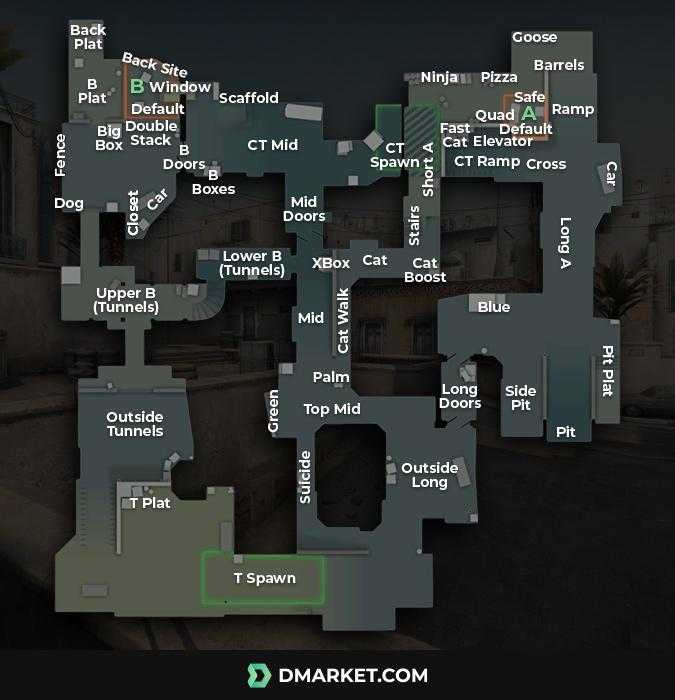
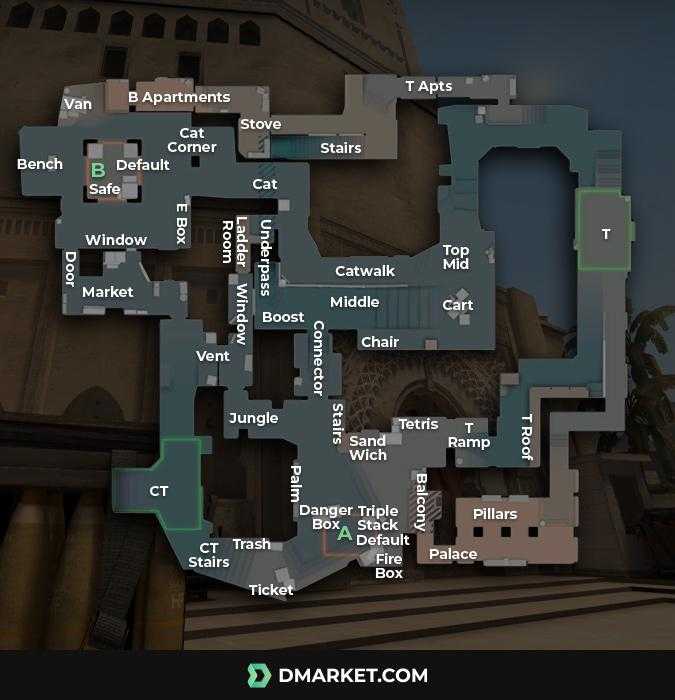
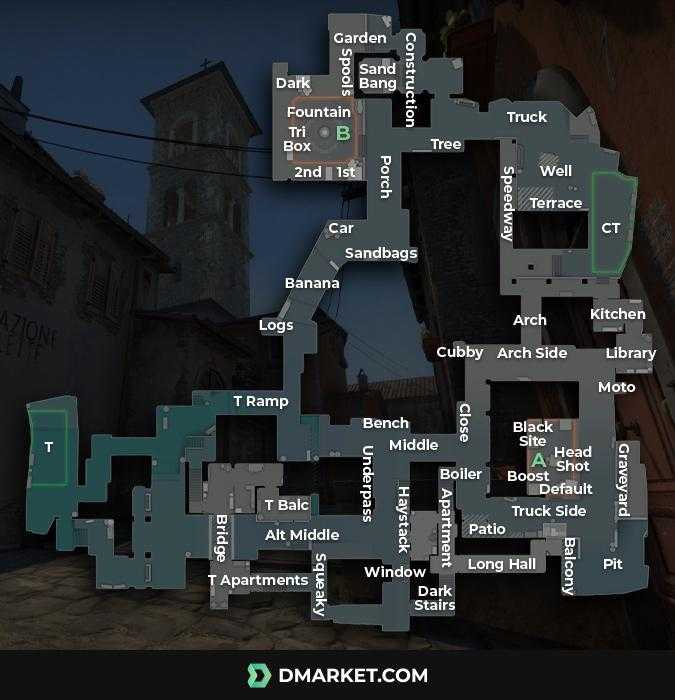
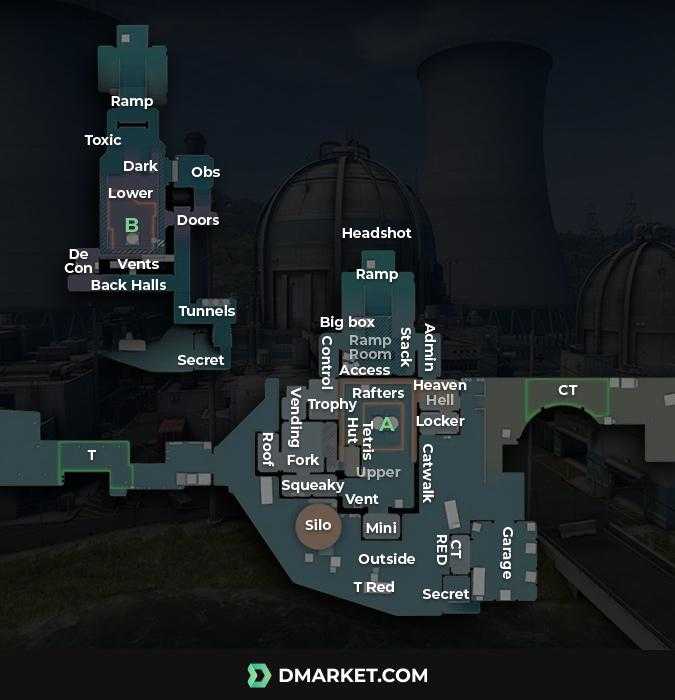
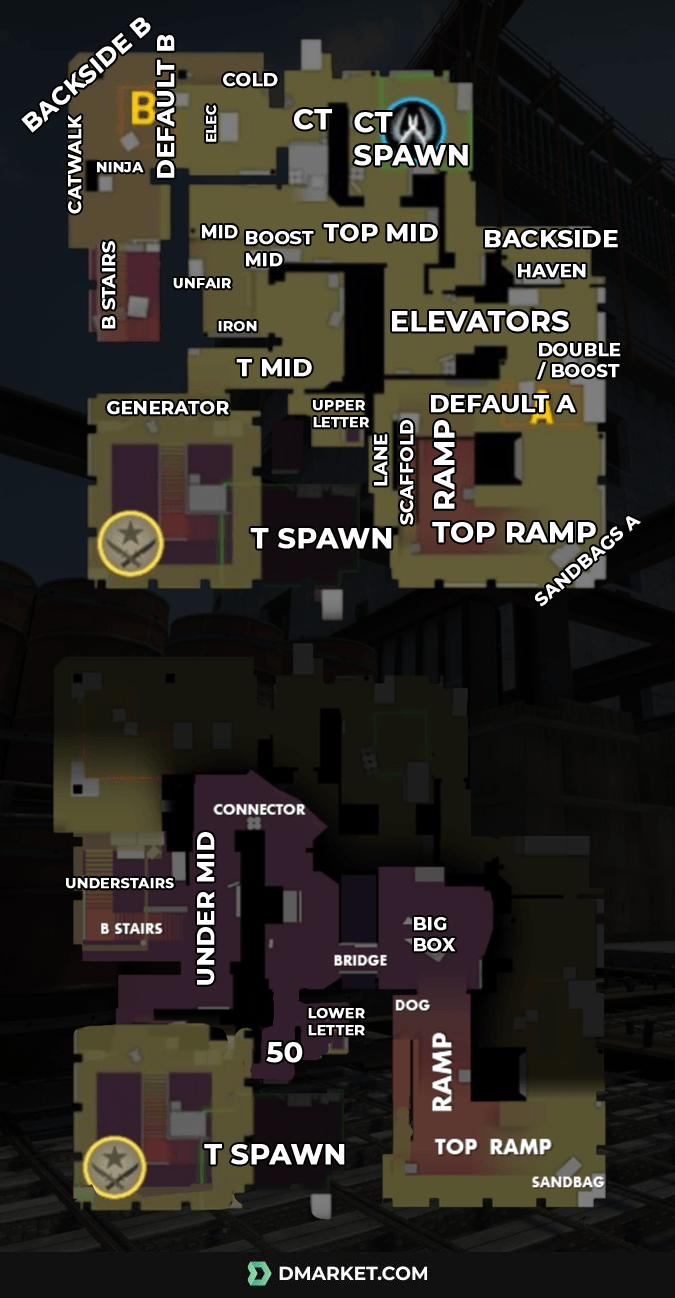
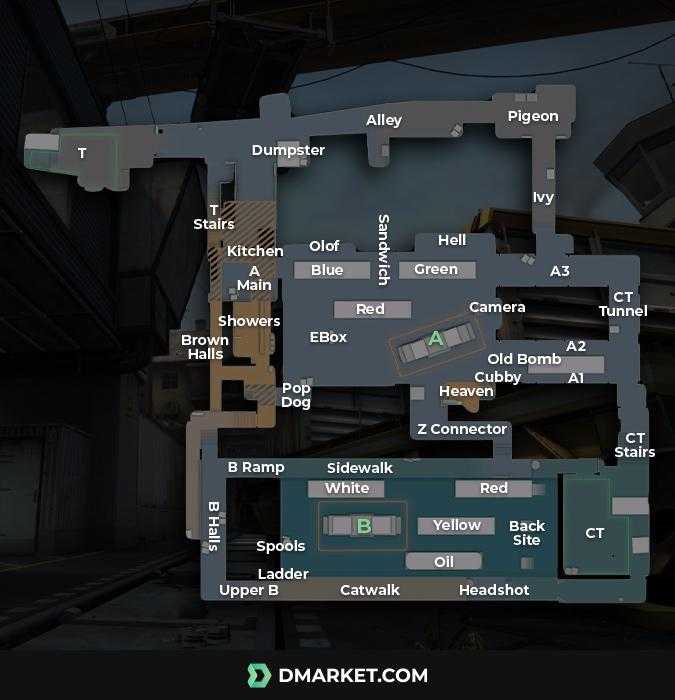
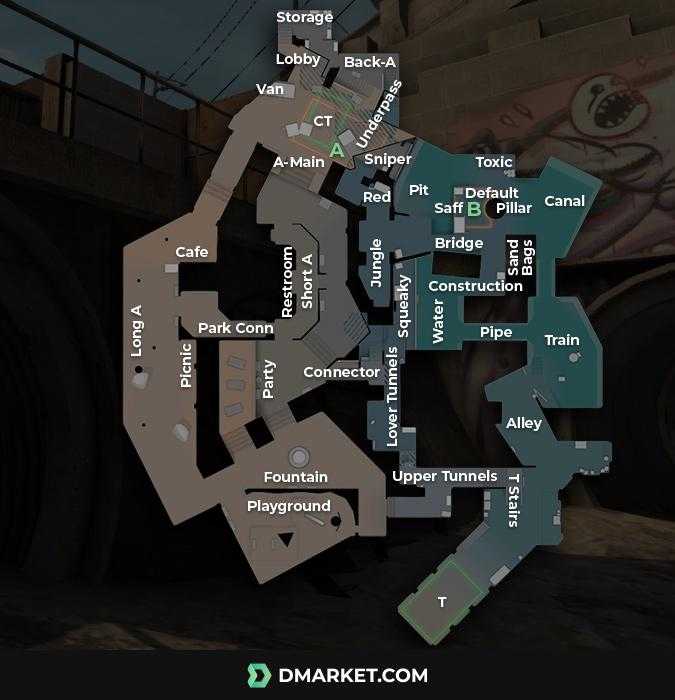
For starters, do not use in-game voicechat as a means to chat to your friends. This will not only annoy people, but will make sure other people are not hearing footsteps, gunshots, bomb plant noises, etc. Make sure you don't use voicechat for anything other than communication during the round.
You should use the info effectively. What this means is that you don't want to make assumptions based on limited information. There might always be more people in one location. Do not call "5 B" when you've only seen 2 or 3, as there could be people flanking, and it could be deadly for your teammates as they will try and use the info you've given effectively. Make sure you use the names of spots and not "behind" unless you've been killed from a place from behind and could not identify the location. This will make sure that they check everywhere while pushing it and will expect a peek from any location.
While playing any competitive match, you will come across a teammate who will always flashbang you, leading to your death. However, would it be the same with him calling the flash he was throwing? I don't think so. You have fallen victim to a case of team-flashing. There is a really easy way to prevent this both for yourself and your team.
Calling your flashes - Calling your flashes is a very effective way to minimise team-flashing. This will ensure an efficient attack/push on a bombsite. If your teammate is pushing ahead into B on Dust2, and you have not called your flash, you will end up flashing him. Which will either make them stop pushing or lead to their death, giving you a disadvantage on that push. It will also make sure the enemy stays alive, even after they were flashed. So give them a head's up!
Calling your smokes - Smokes can be heard in most cases from really far away. This can be used to identify an enemy or groups of enemies pushing onto a site. By calling your smokes, you can ensure that your teammates on site A do not rotate to site B. You might think this does not happen, but it happens more often than you might imagine.
Calling your Grenades, Molotovs and Incendiaries - In competitive gameplay, team damage will most likely be enabled. By calling where you throw your damaging utility, you can minimise the team damage. For example, if you want to throw a grenade down Long and your teammate is pushing, you could ask them to stay put as you will now be throwing a grenade, or a molotov and vice versa.
Combining all of these will give you a big advantage in gameplay.
Bear in mind that calling only your own utility simply is not enough. Any utility thrown by the enemy should also be called out, as it may or may not have importance for your teammates, allowing them to know how much utility the enemy team still has.
Learning how to communicate isn't an easy task, as you generally improve so will your communication skills. Thank you for reading this article. If you have any questions or suggestions feel free to reach out to me via my Twitter.
Visit our partner VIE for the safest market and best customer care in esports betting.
Must be age 18+ and reside in a country where online gambling is legal. Gamble responsibly